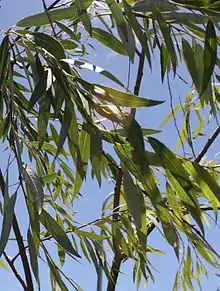Salix mucronata
Salix mucronata (commonly called the Cape silver willow or Safsaf willow) is a tall, graceful, evergreen willow tree. It grows along riverbanks in South Africa, and is used for a wide range of traditional medicines.
The Cape willow is dioecious (separate male and female trees).[1][2]
| Salix mucronata | |
|---|---|
 | |
| Scientific classification | |
| Kingdom: | Plantae |
| Clade: | Tracheophytes |
| Clade: | Angiosperms |
| Clade: | Eudicots |
| Clade: | Rosids |
| Order: | Malpighiales |
| Family: | Salicaceae |
| Genus: | Salix |
| Species: | S. mucronata |
| Binomial name | |
| Salix mucronata | |
| Synonyms | |
|
Salix hirsuta | |
Taxonomy
This variable-looking species was previously subdivided into a number of different species. These have now all been downgraded to just being subspecies of Salix mucronata. These subspecies include:
- S. m. hirsuta (silver willow)
- S. m. mucronata (Safsaf willow)
- S. m. woodii (flute willow)
- S. m. capensis (small-leaved willow)
| Wikimedia Commons has media related to Salix mucronata. |
References
- "Salix mucronata | PlantZAfrica.com". www.plantzafrica.com. Retrieved 2017-08-01.
- Davy, Joseph Burtt (1922). "The Distribution and Origin of Salix in South Africa". Journal of Ecology. 10 (1): 62–86. doi:10.2307/2255431. JSTOR 2255431.
- "Salix mucronata (Silver willow)". www.biodiversityexplorer.org. Retrieved 2017-08-01.
This article is issued from Wikipedia. The text is licensed under Creative Commons - Attribution - Sharealike. Additional terms may apply for the media files.